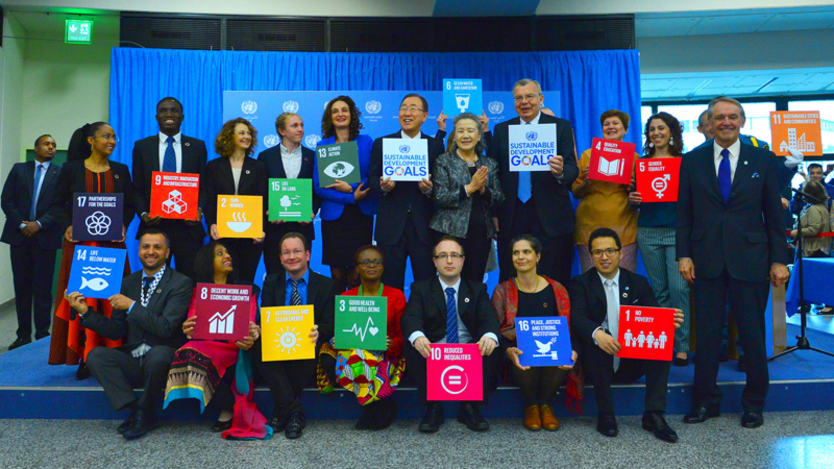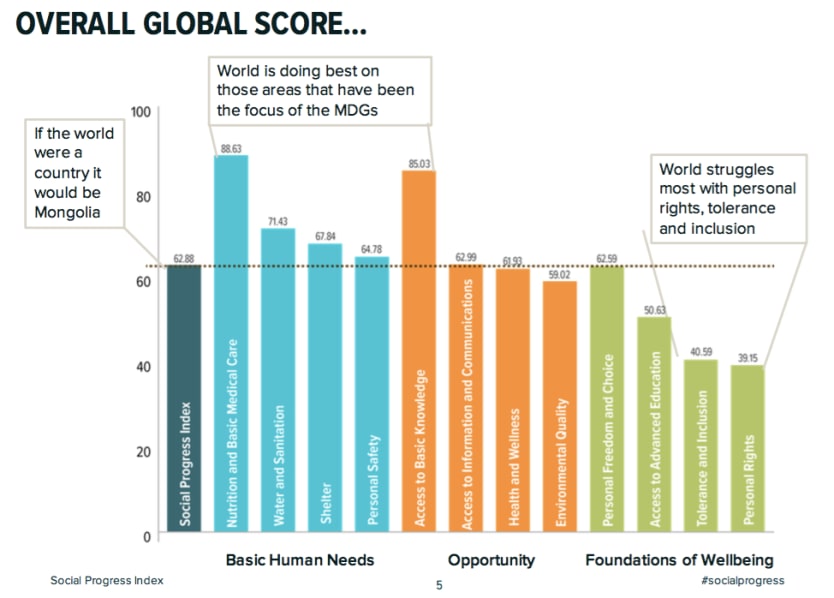
Global progress has been uneven on the major challenges facing the world today. We have made great strides in tackling issues such as nutrition and basic medical care as well as access to basic education. Yet tolerance and inclusion together with health and wellness have fallen behind, still crying out for more comprehensive solutions.
That variation is one of the key findings of the 2016 Social Progress Index report released on June 28. The index provides a comprehensive measure of a country’s social and environmental performance, based on more than 50 indicators. The 2016 index covers 133 countries with complete data and 27 more with partial data, representing 99 percent of humanity.
Finland tops the index with a score of 90.09 out of 100; the Central African Republic is in last place scoring 30.03 out of 100. Summing together all country results, weighted by population size, we find that the world’s average social progress score is 62.88 — equivalent to that of Mongolia or Kyrgyzstan.
Yet we also find a varied picture of humanity’s social progress. Of the 12 components that make up the model, the world does best on nutrition and basic medical care (88.63) and access to basic knowledge (85.03). These aspects of social progress show a strong positive correlation to gross domestic product per capita with relatively small variance around the trend. Simply put: as countries move from low- to middle-income status, most are able to find solutions to the challenges of basic nutrition, reducing maternal and child mortality, tacking infectious diseases, and getting children into school. Through the efforts of national governments, supported by civil society and international development agencies, we are getting close to solving these problems.

By contrast, the world as a whole scores lowest on personal rights (39.15) and tolerance and inclusion (40.59). The relationship between these indicators and GDP per capita is not as simple as it is for access to basic education, for example. These are stickier problems for which even wealthy countries struggle to achieve high scores at times. New solutions are needed that are not just about getting richer.
In addition, environmental quality (59.02) and health and wellness (61.93) show the least improvement with rising GDP per capita, with the most noise around the overall trend. Intuitively we can see that these are aspects of social progress for which rising economic prosperity may bring costs as well as benefits: Industrialization leads to rising greenhouse gas emissions and may threaten natural habitats and biodiversity; obesity is an epidemic that is now hitting countries even at relatively modest levels of GDP per capita.
It is also the case, however, that the world has invested enormous effort in the last 15 years in finding solutions to issues such as nutrition, malaria, and primary education, driven by the Millennium Development Goals. Rights, tolerance and health problems such as obesity were not among those targets. Having invested less in finding solutions for the latter set of problems, it is perhaps no surprise that we are further from solutions. This is the challenge of the new Sustainable Development Goals, which have widened the development agenda beyond the elimination of extreme poverty.
The Social Progress Index can help the world rise to this challenge. Rather than looking simply at which countries have the highest scores (“getting to Denmark” or, in the case of the 2016 index, “getting to Finland”), we can look at which countries are over-performing relative to countries with similar GDP per capita. Through this lens, the world looks rather different. Some of top performing countries relative to their GDP per capita are Costa Rica, New Zealand, Nepal and Malawi; the underperformers include China, the United States, and Russia.
We can disaggregate this analysis further to the individual components of the models. Here we find that Vietnam, Japan and Greece are significant overperformers on health and wellness; Uruguay, Portugal and South Africa are major overperformers on tolerance and inclusion; and so on. These countries may have found solutions to the hard problems that the world is wrestling with. By shining a light on such cases, the Social Progress Index hopes to accelerate progress toward achieving the SDGs.
Join the Devex community and access more in-depth analysis, breaking news and business advice — and a host of other services — on international development, humanitarian aid and global health.
